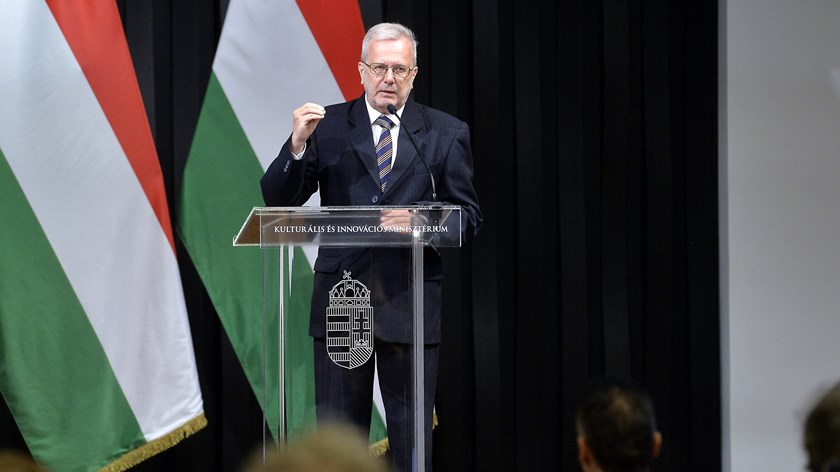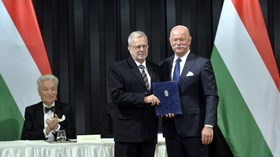Professor Balázs Gulyás to be appointed President of the Eötvös Lóránd Research Network

Laudation by Prof. Dr. E. Sylvester Vizi, former President of the Hungarian Academy of Sciences, Chair of the Friends of Hungary Foundation:
Minister,
Ladies and Gentlemen,
I have received an honorable invitation from Minister János Csák to recognize the career of Professor Balázs Gulyás, an academic who is to be appointed to the vacant post of President of the Eötvös Lóránd Research Network. A career that began with his schooling in Pannonhalma, medical studies at Semmelweis University, and then studying physics at Eötvös Lóránd University for several years in 1981. He then left Hungary to pursue an MA in philosophy at the Catholic University of Leuven, beginning his more than four decades abroad. He earned his PhD at the University of Leuven and then did postdoctoral research, gaining experience, studying, and publishing at Oxford and the Karolinska Institute in Stockholm. In addition, he also holds a degree in mathematics from the Open University of London and a postdoctoral qualification in medicine from the Universities of Leuven, Stockholm, and Debrecen. To date, he has co-authored 14 books, 250 scientific papers, and seven patents. In 1995, the General Assembly of the Academy of Sciences elected him as an external member of the Academy. In addition to the Hungarian Academy of Sciences, he is a member of the Royal Belgian Academy of Medical Sciences and the European Academy of Sciences, where he is currently President of the Section on Life and Neurosciences. He is an Honorary Professor at Imperial College London, former Vice-Chairman of the Nunyang University Senate, and Chairman Emeritus of the Neuroscience and Mental Hygiene Program at the University's School of Medicine. He attends management and leadership courses at the Universities of London, Oxford, and Harvard Business School. He is a member of the European Research Council Advanced Grant Committee.
His major works include: the development and advancement of positron emission tomography (PET) applications, clarification of the physiological and pathological role of the blood-brain barrier, particularly its role in the therapeutic use of drugs, the first map-like description of brain areas important for vision, sense of smell, and even the brain's role in memory storage. This method will later lead to the noninvasive study of certain brain diseases at the molecular level. His method provides a way of thinking about how drugs used for certain neurological diseases work. Last year, in 2022, a summary article on the importance of this method was published in the journal Drug Discovery Today.
He is currently investigating the non-invasive possibility of "silent communication" between two human brains, i.e., the transmission of thoughts, and is thus exploring a completely new feature of the human nervous system at the peak of the development of the living world.
His work clearly demonstrates a commitment to the usefulness and value-creating nature of research, which is now also referred to as translational research. This is also true of his activities in science policy and organization. For example, at a major university in Singapore, repeatedly ranked among the top ten countries in the world for RDI, he has been invited to establish and organize a state-of-the-art institute, conduct scientific research, and train doctoral students.
Under his organization and expert leadership, the first PET center in Central Europe and Hungary opened in Debrecen in June 1994. Using ultra-short half-life isotopes (11C, 18F, etc.), it is possible to measure the function of certain areas (brain, heart, etc.) and the effect of drugs in humans by whole-body examinations. This method will help to make two Hungarian drugs successful. In both of them, our joint research and organizational work is evident and this still fills me with pride.
It is impossible not to mention that together with his friend Sándor Lámfalussy from Leuven, the Nobel Prize winner György Oláh, the world-famous Éva Marton, Sir George Rada, and Professor Alfréd Paszternák, who died a few weeks ago, he helped to establish the Friends of Hungary Foundation to unite opinion-forming Hungarians from all over the world and to help Hungary gain international recognition.
Another joint success should be mentioned here: The World Science Forum, which we launched together with UNESCO in the first years of my academic presidency, and in the organization of which Balázs Gulyás played an incredibly important role. It made Budapest the capital of the scientific world in those days.
Professor Balázs Gulyás, a member of our Academy, is returning to his homeland after four decades. As the above examples show, he has actually never left our country as far as the Hungarian scientific community is concerned. Thanks to his appointment as a minister, he will take charge of the country's largest research network, whose mission is to develop the power of science and the intellectual capital available in its institutes to shape the economy and society for the benefit of the country, and to build a bridge between the world and domestic institutes and scientists. The presence of Sir Philip Cambell and Professor Alexander Zehnder (Zurich-Lausanne) at this solemn occasion is symbolic of this. Welcome, Sir Philip and Professor Zehnder....
Ladies and Gentlemen,
The day before yesterday, Pope Francis concluded his three-day visit to our country. I will borrow one of his metaphors. He spoke of bridges that unite, not divide, people, countries, nations. Knowing the career of Professor Balázs Gulyás, we have every reason to believe that with his help, Hungarian science will play the role of a bridge. Balázs Gulyás, currently director of the Nanyang University Research Institute in Singapore and professor of clinical psychiatry at the Karolinska Institute of Clinical Psychiatry at Stockholm University, is returning to his homeland after four decades.
With him, the minister has invited home a renowned scientist, a man with philosophical and even theological insights into human society and experience in leading science policy - what I call -instead of brain drain- a real brain gain.
I wish you every success in your work!
Thank you very much!
Photos: MTI/Soós Lajos
